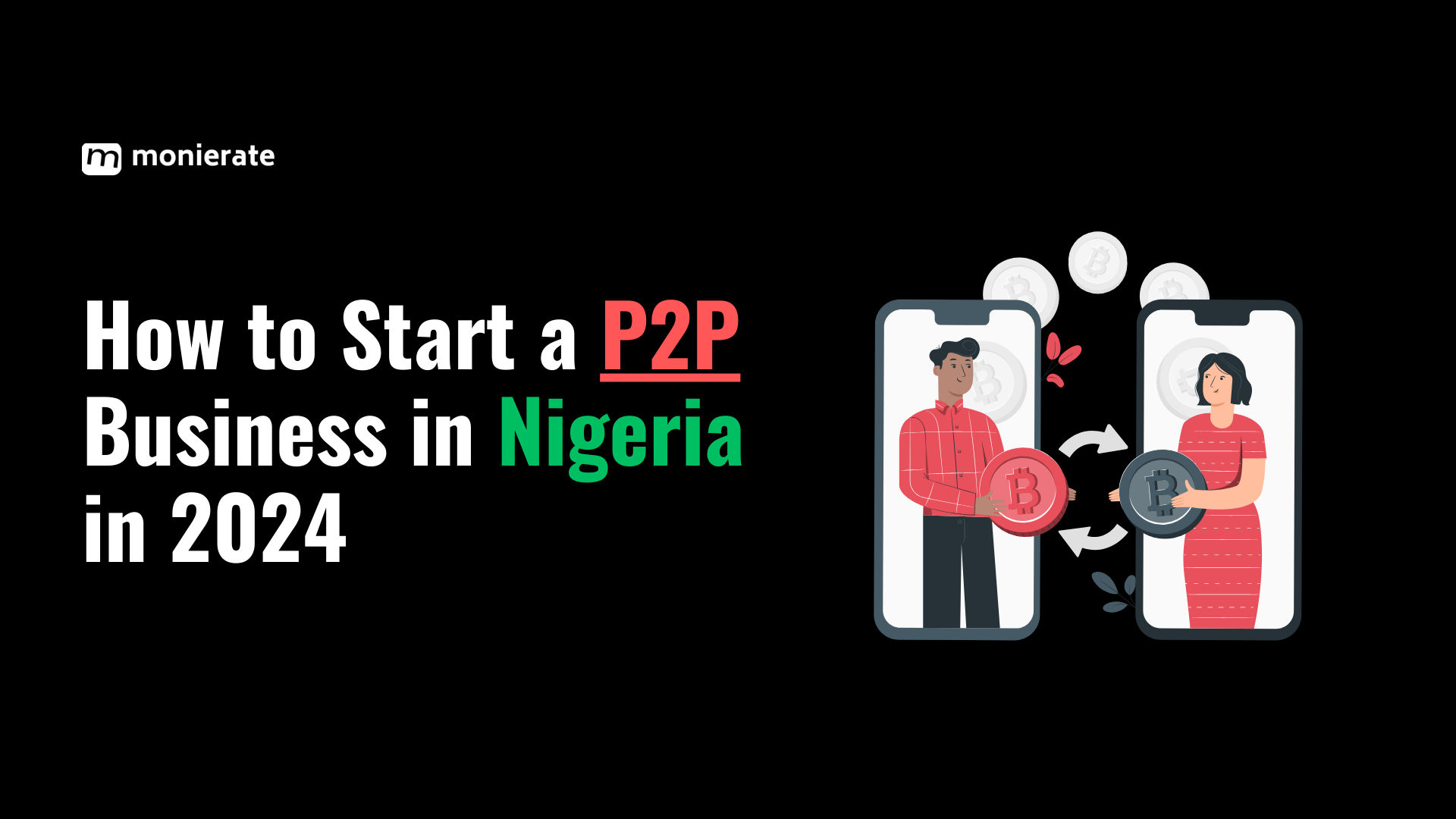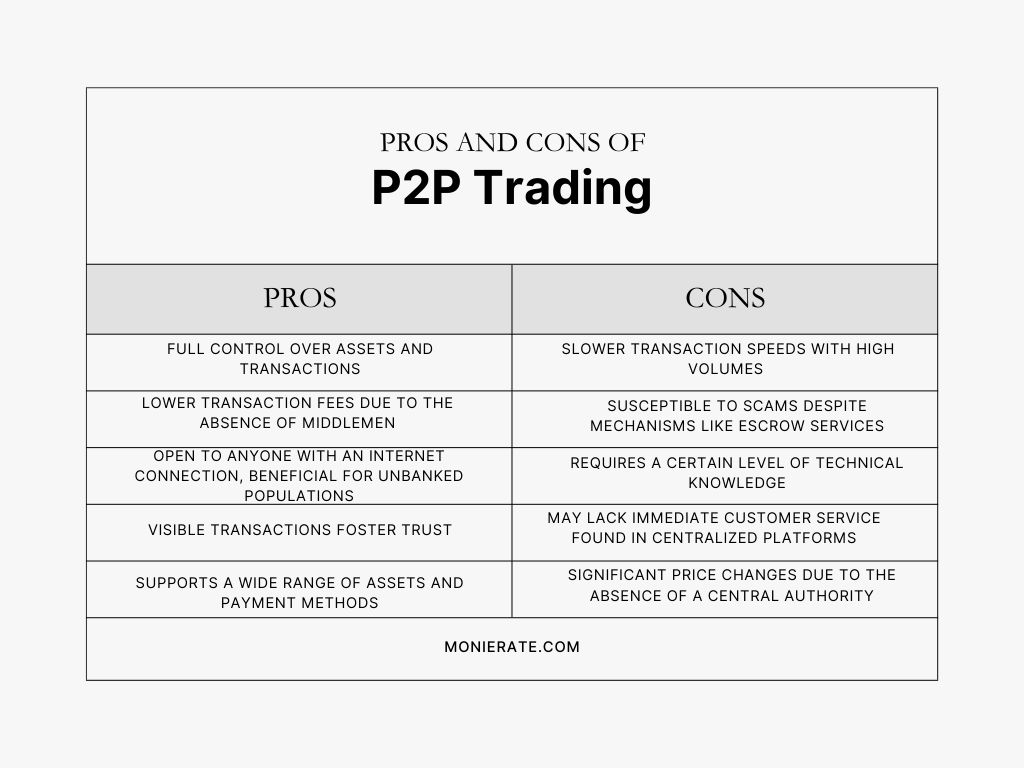
Today, making money online is the new trend; one doesn’t need a physical workspace to earn. The cryptocurrency space is one of the avenues making this possible using the internet and your device.
Before embarking on the entrepreneurial world of crypto in Nigeria, it is good to first know the basics. It is one thing to know how to convert crypto to Naira and another thing to be updated with the exchange rate playing its part in this big picture. These details are the cornerstone of your P2P business.
This article gets into the nuts and bolts of how you can get started. But first and foremost, what does P2P trading mean?
What Is P2P Trading?
P2P trading is a straightforward way to buy and sell cryptocurrencies directly between users, without relying on a traditional exchange. Typically, you need a P2P platform, but sometimes just the recipient’s wallet address suffices, depending on your chosen business model.
Also known as the peer-to-peer model, these platforms function as marketplaces where sellers list cryptocurrencies for sale, specifying price and preferred payment method (often bank transfer or mobile money).
Buyers then browse listings and select offers that suit them. Ultimately, the platform acts as an escrow to hold the coin until the buyer pays the seller, ensuring transaction security.
It is widely preferred in Nigeria but with flexibility comes potential downsides, like scams, limited payment methods, delayed transactions, disputes in communication between trading partners and the main issue being price volatility (we’ll take a look at this later in this article).
Building a good reputation on P2P platforms can also take time, as users find it challenging to establish trust for traders with fewer ratings. This is why smart P2P traders prefer building networks and direct marketing to exchange platforms.
Popular P2P platforms like Remitano, Bybit, and Noones offer a starting point for those interested in this trading method.
What you need to start a profitable P2P business in Nigeria
We mentioned two options (though you may not noticed) you can carry out P2P trading and each method requires similar but specific needs:
Option 1: Trading with a P2P Marketplace
Capital: Start with a reasonable amount of capital to buy cryptocurrencies. The amount can vary depending on your financial capacity, but having at least ₦200,000 to ₦500,000 can help you make meaningful trades and build your portfolio.
Crypto Exchanges: Find a good platform where you can own a wallet and buy and sell coins at favourable rates. The reason for choosing a platform with favourable rate is so that you can buy coins and sell them at higher prices for a profit. Look for platforms that offer escrow services to protect your transactions.
Verification: Complete any necessary identity verification processes required by the platform to ensure you can trade without restrictions.
Payment Methods: Set up multiple payment methods to offer flexibility to your trading partners. Common methods include bank transfers, mobile money, and other local payment options.
Reputation Building: Engage in small trades initially to build your reputation on the platform. Positive reviews and ratings will help attract more trading partners.
Market Research: Stay updated on market trends and set competitive prices to attract buyers and sellers.
7: Stablecoins: Using stablecoins such as USDT and USDC can help you avoid losses due to quick price changes. When you make a profit on a trade, you can convert your earnings into stablecoins to maintain their value until you’re ready to trade again.
Trading directly without relying on a third-party platform:
Crypto Wallet: Secure a reliable crypto wallet where you can store your cryptocurrencies. Ensure it supports the coins you plan to trade.
Networking: Build a network of trusted buyers and sellers. This can be done through social media, forums, and local crypto communities.
Security Measures: Implement strong security measures to protect your transactions. This includes using secure communication channels and verifying the identities of your trading partners.
Pricing Strategy: Develop a pricing strategy that allows you to buy cryptocurrencies at lower rates and sell them at higher prices for a profit.
Legal Compliance: Ensure you comply with local regulations regarding cryptocurrency trading to avoid legal issues. For example when sending naira to your customer back account, do not use crypto related words in the narration and avoid including decimals in the amount; inform your customers to also do the same. This will keep your bank account safe from freezing.
Capital: Similar to trading on a P2P marketplace, you will need initial capital to buy cryptocurrencies. Starting with ₦300,000 to ₦500,000 can provide a good foundation for your trading activities.
Stablecoins: Also, when trading directly with other individuals, stablecoins provide a way to protect your profits from market fluctuations. After completing a trade, converting your earnings into stablecoins ensures that you retain the value of your profits.
So, how can you make money with P2P trading?
There are several strategies to explore:
Leverage Arbitrage Opportunities
Capitalize on price differences between different crypto exchanges or even fiat currencies. While it requires constant monitoring, arbitrage trading can yield significant profits.
Abitraging is the process of buying at a lower price from one platform (or trading market) and selling at a higher price in another platform (or trading market). For instance, Sam Bankman Fried, discover that the price of Bitcoin on a Japanese exchange platform is $11,000 and the price of Bitcoin in a US exchange platform is $10,000. So this guy (who is currently in prison though) neatly bought $1M worth of Bitcoin in the US exchange and sold it on the Japeneese exchange making him $100,000 within few hours.
Here are two types of arbitrage trading:
- Crypto Arbitrage Trading: This involves buying and selling crypto assets on different markets to profit from their price differences. For example, if the BTC price is $36,300 on Binance Spot but you have a sell offer of $36,500 on Binance P2P, you can buy at Binance Spot and sell for $36,500 on the P2P market to make a profit. The secret is to buy low and sell high.
- Fiat Arbitrage Trading: Similar to crypto arbitrage trading, but involves trading fiat currencies on two different platforms to take advantage of their price differences. Many P2P fiat markets accept over 50 local currencies, making it easy to search for price differences and leverage them to make money.
Master the Art of Pricing
Strategic pricing can attract more buyers and boost your earnings. Whether you choose fixed or floating prices, understanding market trends is crucial:
Fixed Price: Set a fixed price for your trades somewhere above your cost price to ensure a profit margin.
Floating Price: Set a floating price margin that fluctuates with the market, allowing you to buy at the market price and sell at a higher rate.
Publish Buy and Sell Ads
You can earn money from publishing buy-and-sell ads on the P2P platform to meet the crypto community’s goals and objectives.
For example, with Bybit P2P, you can generate more revenue with ads by setting a wide price range or get more target customers by setting a thin price spread.
You’ll gain a strong reputation in the community by setting a competitive price point.
Earn Merchant Incentives and Commissions
You can make money from P2P trading when you become a top-ranking merchant on the platform. This comes as a reward for your sales on the platform.
For example, on the Bybit P2P exchange, a top merchant can earn up to 200 USDT per fiat currency weekly and 400 USDT per two different fiat currencies he listed ads for.
As a merchant, you need to be ranked among the top three merchants in total USDT sales and meet some requirements, such as staying online for at least 50 hours, before you can be eligible.
If you want to become a merchant, simply create an account on the P2P exchange you are using and start posting offers.
Remember, success in P2P trading often comes down to understanding your target market, building trust, and managing risks effectively.

Starting a P2P business: How to gain an edge over price volatility
Price volatility refers to the rapid and significant fluctuations in the price of an asset over a short period.
This means that the prices of cryptocurrencies can change quickly and unpredictably due to various factors such as market demand, regulatory news, and overall market sentiment.
It can be both good and bad for P2P traders.
To handle these ups and downs effectively in your P2P trading business, you can:
- Diversify your investments across different assets to mitigate the risk of being heavily exposed to a single asset’s price fluctuations.
- Use hedging techniques such as futures, options, or swaps to offset potential losses and stabilize your costs as well as protect your profits.
- Convert your earnings into stablecoins to help maintain the value of your assets until you’re ready to trade again.
- Stay updated on market trends and analyze competitor behaviour. Understanding how competitors respond to price fluctuations can help you identify opportunities or threats in the market.
- Implement dynamic pricing strategies that adjust based on market conditions. This can help you remain competitive and maximize profits during periods of high volatility.
- Use tools and technologies for monitoring and predicting price changes. These tools can help you make informed trading decisions.
- Offer good prices and service. Happy customers will stick with you, even when prices change. By following these tips, you can better handle price changes and be more successful in P2P trading.
Conclusion
Making money online has never been as easy as it may sound but one thing is certain; the interest in crypto among Nigerians is here to stay.
P2P trading offers significant economic freedom due to the absence of intermediaries. As a result, the number of P2P platform users continues to grow.
By applying the strategies discussed in this article, you can successfully start and profit from a P2P trading business.
